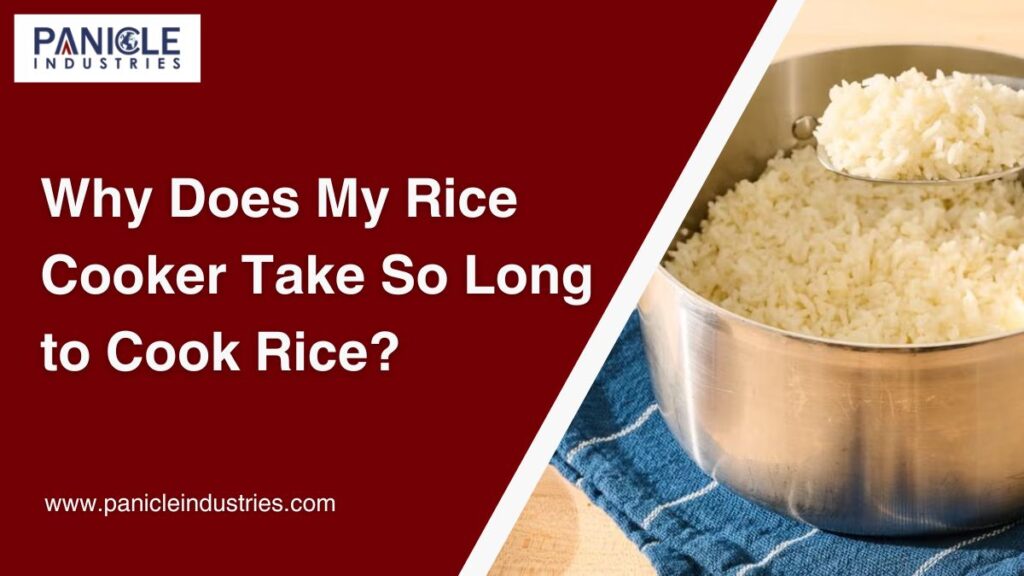Cooking rice should be simple, yet sometimes you find yourself waiting too long and wondering, “Why does my rice cooker take so long to cook rice?” Rice cookers are designed to make the cooking process easier, but the time they take can vary depending on several factors. The type of rice, the amount of water, the model of the cooker, and even the condition of the appliance all affect cooking time. Some rice cookers are faster, while others take longer but ensure better texture and flavor.
In this blog, we will explain why rice cookers may take more time than expected, what factors influence the process, and how you can speed up cooking without compromising quality.
Understanding How a Rice Cooker Works
A rice cooker is a simple yet smart kitchen appliance. It uses a heating plate, water, and steam to cook rice evenly. The cooker automatically adjusts heat and cooking time based on the amount of water and rice. Once the water is absorbed and the rice is soft, the cooker shifts to “keep warm” mode. The design ensures convenience, but sometimes the process feels slow compared to traditional cooking.
Also read: Where Does Rice Come From and How Is It Grown?
Why Does My Rice Cooker Take So Long to Cook Rice?
Several reasons can explain why your rice cooker is taking longer than expected. Let us break them down:
- Type of Rice
Different types of rice have different cooking times. White rice usually cooks faster, while brown rice, wild rice, or sticky rice take longer because they have harder outer layers. - Amount of Rice and Water
The more rice and water you put in, the longer it takes to cook. A small portion may finish in 20–25 minutes, but a large pot can take 45 minutes or more. - Soaking Time
Some rice varieties require soaking before cooking. If you skip this step, your cooker may take longer to fully soften the grains. - Cooker Settings
Modern rice cookers often come with multiple settings—white rice, brown rice, porridge, or slow cook. Choosing the “brown rice” or “slow cook” setting will naturally take more time. - Power of the Cooker
Not all rice cookers are equally powerful. Basic models may take longer because they heat at a lower wattage, while high-end models are faster. - Age of the Cooker
An older rice cooker may take longer due to wear and tear. If the heating plate or sensors are not working properly, the cooking time increases.
Average Cooking Time for Different Types of Rice
- White Rice: 20–30 minutes
- Brown Rice: 40–50 minutes
- Wild Rice: 50–60 minutes
- Sticky/Glutinous Rice: 30–40 minutes
- Mixed Grain Rice: 45–60 minutes
Knowing these averages helps you set realistic expectations and avoid thinking something is wrong with your cooker.
How to Reduce Cooking Time in a Rice Cooker
While rice cookers are designed to take their time for perfect results, there are ways you can speed up the process:
- Soak Rice Before Cooking
Soaking rice for 20–30 minutes before placing it in the cooker softens the grains and reduces cooking time. - Use Warm Water
Starting with warm or hot water instead of cold can save a few minutes. - Cook Smaller Batches
Large quantities take longer. If you are in a hurry, cook smaller portions. - Check the Rice-to-Water Ratio
Using too much water extends cooking time. Follow your cooker’s manual for accurate measurements. - Keep the Cooker Clean
A dirty heating plate can affect performance. Regular cleaning ensures even heating and proper cooking speed.
Is It Bad If a Rice Cooker Takes Longer?
Not at all. A longer cooking time does not mean the appliance is faulty. In fact, some rice cookers intentionally take longer to enhance the flavor and texture of rice. Slow cooking allows the grains to absorb water evenly, resulting in fluffier rice. Unless your cooker takes unusually long (like over 90 minutes for white rice), there is usually no problem.
Common Mistakes That Increase Cooking Time
- Adding too much water.
- Lifting the lid frequently during cooking.
- Cooking unwashed rice, which causes stickiness and uneven heating.
- Using the wrong setting for the rice type.
Avoiding these mistakes can save time and improve results.
When to Worry About a Slow Rice Cooker
If your rice cooker takes much longer than the average cooking times listed above, it may be time to check:
- Heating Plate: Ensure it is clean and functioning.
- Power Supply: Low voltage or faulty wiring can slow cooking.
- Appliance Age: Very old cookers may need replacement.
If all else fails, replacing the rice cooker with a modern model may be the best solution.
Advantages of Letting the Cooker Take Its Time
Although it can be frustrating when cooking feels slow, there are benefits:
- The rice turns out fluffy and evenly cooked.
- The natural flavor of the rice is enhanced.
- It prevents undercooked or burnt rice.
Patience with your rice cooker often rewards you with a better meal.
Tips for Choosing a Faster Rice Cooker
If speed is important, consider these features when buying a new rice cooker:
- High wattage for faster heating
- Fuzzy logic technology for smart cooking adjustments
- Quick cook mode for urgent meals
- Non-stick inner pot for better heat distribution
These modern features make cooking more efficient without compromising taste.
Conclusion
So, why does my rice cooker take so long to cook rice? The answer depends on the type of rice, the amount of water, the settings used, and even the model of your cooker. While it may feel slow, in most cases the cooker is simply ensuring your rice is cooked perfectly. Simple steps like soaking rice, using warm water, and avoiding excess quantities can help reduce cooking time. If your cooker is old or inefficient, consider upgrading to a modern model with faster features.
Remember, good rice takes patience, and a slightly longer wait often means fluffier, tastier, and more enjoyable results.


